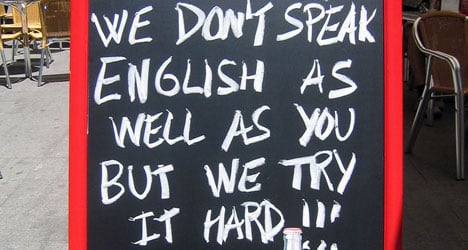Although Spain has been improving when it comes to learning English and the younger generation is far ahead of their parents and grandparents in terms of speaking the language of Shakespeare, there is huge room for improvement.
This week international language training company Education First placed Spain well below the European average for English proficiency and woefully far behind the Scandinavian nations.
So what can Spaniards do to improve?
Stop dubbing movies
Spaniards could really learn from their neighbours in Portugal (which ranks at number 13) and opt to watch films and television series in their original languages.
“A lot of television channels have the option to choose to watch in the original version and if possible to seek out cinemas specializing in VO films,” suggests Craig Thomas, an English language learning consultant based in Madrid.
“It improves basic listening skills and provides the opportunity to hear different accents, from American English to regional accents from across Britain.”
Have some confidence and socialize

Photo: Muchomasqueidiomas
Don’t be shy about your Spanish accents, instead find a relaxed group that you are comfortable with and keep practicing until you gain in confidence.
“Meeting in a social group to speak English can be great fun and it is amazing how quickly the inhibitions can fade over a glass of wine,” advises Samantha Chappell, an English teacher based in Oviedo, who started the Conversation Club Asturias.
“It also provides the opportunity for romance, of course, and what better way to practice than by making it the language of love?”
Host a student

Photo: Luftphilia/Flickr
With Spain ranking as the most popular destination for Erasmus students, those with a spare-room might consider playing host to a foreign student.
Although the idea is for the visitors to improve their Spanish it provides a brilliant opportunity to get to know a native speaker. Insist on setting a certain amount of time each day where just English is spoken and you will see an improvement in no time.
“Check with the local universities and get your name on the waiting list as a host family,” suggests Chappell. “Some schemes see families paid between €600 and €700 to host an Erasmus student.”
Join an activity

Photo: AFP
Ditch the textbooks and combine an enjoyable pastime with speaking English
“Most people don't enjoy learning a language through doing grammatical exercises in an anonymous class which traditionally has been happening for decades,” explains Romina De Simone, the founder of Mucho Mas Que Idiomas, which organizes groups combining language learning with activities.
“So why not combine learning a language with doing something you enjoy, like a cookery course, a museum trip or a sporting activity?”
It’s a way of practising English with other people with the same interests and passions.”
Tread the boards

Photo: Pedro Patel / Flickr
Where better to learn the language of Shakespeare than on the stage?
“Getting involved in English speaking amateur theatre groups is a great way to really advance your language skills,” insists Mary Reid, a long standing member of the Madrid Players.
“Some people start in the back stage areas or with small roles maybe in the chorus but as their confidence and English improve they have the opportunity to do more”.
Go abroad or to the Brit-filled Costas

Magaluf. Photo: Jaime Reina/AFP
Travel to English speaking countries whenever possible. New York and London may be expensive but there are plenty of cheaper options away from the capitals.
And if you really don’t like flying, just head to Benidorm or Benalmadena, Tenerife or Magaluf and make friends with some British holidaymakers.
“When travelling don’t make the mistake of sticking in a Spanish group. Try to mingle with foreigners. Brits may appear standoffish but perservere and you will be rewarded,” advises Chappell.
Start young and make learning fun

A stock photo of children in a classroom. Photo: Public Domain Images.
Don’t rely on your kids just learning their English in school. Although many state-schools now have bi-lingual programmes, learning English can become a chore rather than a pleasure.
“It’s important to make English fun for children, through activities like storytelling in English or going to the English language theatre” explains Amy Elliott who set up Stepping On Stage, which organizes English activities for children.
“Storytelling is a unique way for children to develop an understanding, respect and appreciation for other cultures, and can promote a positive attitude to English learning.”
Learn from the front

Photo: AFP
It can be seriously embarrassing if you are the one person at a very important meeting you can’t string a sentence together in English, as this photo of Prime Minister Mariano Rajoy demonstrates.




 Please whitelist us to continue reading.
Please whitelist us to continue reading.
Member comments